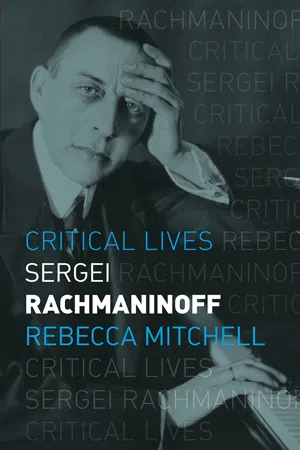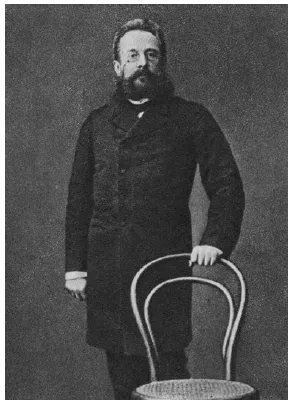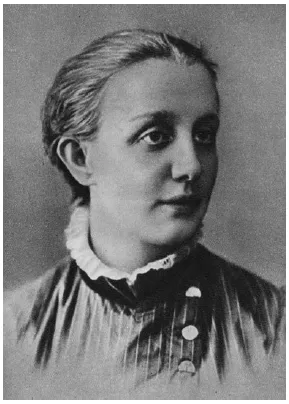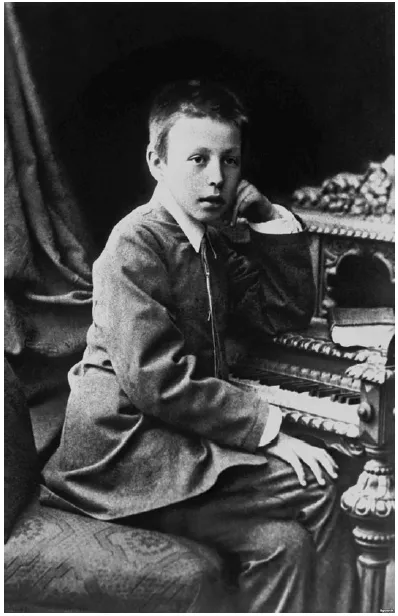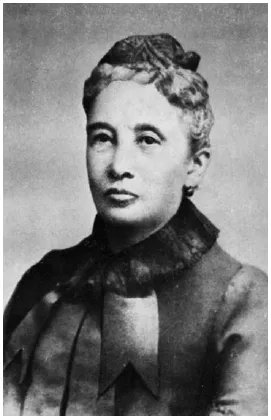![]()
1
The Making of a Moscow Musician
Reflecting back on his childhood from the distance of emigration in 1931, Rachmaninoff waxed eloquent over the lost world of ‘old Russia’:
Do not forget, that everything great, in which the entire country can take pride, was born and lived in old Russia. Our great writers, famed throughout the world, like Tolstoy, Dostoevsky, Turgenev and Chekhov were born and died in old Russia. All the famous composers, like Tchaikovsky, Mussorgsky, Rimsky-Korsakov, were born and died there too. Famous scientists like Mendeleev, Mechnikov, Pavlov, also belong to this old Russia. Do not forget, that all the artistic treasures of the country, located in the museums of Moscow and Petrograd, were collected by people of old Russia.1
Rachmaninoff’s dislike of the 1917 Revolution that drove him into permanent exile is no mystery. And it is small wonder that later interviews are full of nostalgic glimpses of his youth in an idyllic, unchanging Russia – a land of picturesque noble country estates, resonant church bells, sonorous religious chant and troika sleds.
But nostalgia is selective in its evocation, often obscuring as much as it reveals. This halcyon image of Rachmaninoff’s childhood masks an economic structure already in precipitous decline. The 1861 emancipation of the serfs followed by grain competition from the New World and state prioritization of industrialization spelled ruin for many gentry families. Between 1877 and 1905, personal land holdings of the gentry diminished from 73 to 52 million desiatins, while mortgaged noble estates increased from 41,000 in 1889 to 97,000 by 1900.2 Divisions between social estates broke down as peasants moved to cities in search of work. New professional identities emerged that challenged older forms of social cohesion.
Rachmaninoff was born on the family estate of Semenova (Novgorod region) as the fourth of six children in a Russian gentry family threatened by rapid decline. Like most young men of his social estate, the young Sergei Vasil’evich initially seemed destined for a government or military service career. The Rachmaninoff family, which traced its lineage to Moldovan princes, owed its financial success to a great-grandfather who in 1741 supported the daughter of Tsar Peter the Great, Elizabeth Petrovna, when she seized the Russian throne from her infant cousin, Ivan VI. In exchange for this support, he was granted Znamenskoe estate in Tambov region. Rachmaninoff’s father, Vasilii Arkad’evich (1841–1916), had volunteered for military service and fought in the Caucasus, where he participated in the defeat of Imam Shamil, who led resistance against imperial Russian expansion in the region for approximately 25 years. Vasilii then served in Warsaw for several years before making an advantageous marriage. Rachmaninoff’s mother, Liubov, was the only child of General P. I. Butakov, a family connection that made both Sergei and his elder brother eligible to attend the prestigious Pages Corps in St Petersburg, which would have opened the path for either civil or military service careers.3 Given this background of family service, how was it that Sergei Rachmaninoff ended up pursuing music, not just as a hobby, but as a profession, and even a sacred duty?
In addition to state service, Rachmaninoff’s family also had a history of musical talent. Rachmaninoff’s grandfather, Arkadii Alexandrovich Rachmaninoff (1808–1881), had studied piano with famed pedagogue John Field, and had retired early from his military career to his Tambov estate to devote his time to music. Though an amateur, he was a well-known performer at benefit concerts in the region, as befitted his noble status. Rachmaninoff’s father, Vasilii Arkad’evich, improvised at the piano freely. By the mid-nineteenth century, the decline of Russia’s rural economy and the emergence of an urban civil society based on professional training yielded a mismatch between social caste and professional prospects. When famed piano virtuoso Anton Rubinstein returned from Europe to Russia, a deacon in Kazan struggled to determine the young man’s appropriate social ‘rank’ for his record books (‘artist’ or ‘pianist’ were not acceptable titles) before ultimately determining his official social status to be ‘the son of a merchant of the second guild’.4 Rubinstein’s solution to this problem was to found the Russian Musical Society (1859) and its affiliated conservatory in St Petersburg (1862). Conservatory graduates received the title of ‘Free Artist’ (a term originally introduced for graduates of the Imperial Art Academy), and the right to freely reside anywhere in the Russian empire. Rubinstein thus laid the foundation for viewing music as a profession in Russia – a calling also attractive to impoverished nobles like Rachmaninoff. By the time Rachmaninoff’s family sold their final estate, music was an acceptable (if not necessarily prestigious) path for a talented, yet impoverished, young man to follow, particularly as financial constraints made attendance at the expensive Pages Corps impossible.
Vasilii Arkad’evich Rachmaninoff, Rachmaninoff ’s father, 1870s.
Liubov Petrovna Butakova, Rachmaninoff ’s mother, 1870s.
Lev Tolstoy’s opening observation in his novel Anna Karenina, ‘All happy families are similar; every unhappy family is unhappy in its own way,’ could well be applied to Rachmaninoff’s family.5 Vasilii Rachmaninoff’s poor financial management and free-wheeling lifestyle quickly expended his wife’s dowry, and in 1882 the final estate, Oneg, was auctioned off and the family moved to St Petersburg. In order to minimize crowding in the family apartment, Sergei was sent for a time to live with his aunt, Maria Trubnikova. The trauma of his sister Sofiia’s death from diphtheria shortly after the move to Petersburg was exacerbated by the permanent separation of his parents.6 Though divorce was not a viable option under the canon laws of the Russian Orthodox Church, his father would eventually enter into a new common-law partnership, fathering a half-brother. His elder sister Elena, a gifted singer who had introduced her brother to the songs of Tchaikovsky and to whom Rachmaninoff claimed to owe some of his most precious musical childhood memories, passed away suddenly from pernicious anaemia in 1885. Though he retained contact with both parents throughout his life and even provided financial assistance to each of them on numerous occasions (despite his own initially limited resources), Rachmaninoff’s relationship with both parents was strained. In 1891, he wrote to his friend Natalia Skalon, ‘I didn’t go visit my family, though they invited me, because it seems to me that they don’t love me (apart from father, who does not live there). Although they invited me, it seems to me that it is only for appearances.’7 At times, his resentment would spill forth in bitterness, as in an 1893 letter, also to Natalia Skalon:
It is as if all of my family set out to wear me out and drive me into an early grave, not intentionally, but just through the state of things. My close relatives comfort me in the following ways: father is leading a reckless life, my mother is very sick, my elder brother is running up debt, which god knows how he will get out of (hope for my assistance is poor in the current situation); my younger brother is terribly lazy, and of course will be held back a grade again, my grandmother is at death’s door.8
This broken family life imbued the composer with a deeply felt need for familial affection and a determination to provide a more stable home life for his own children.
As a youth, however, Sergei responded to the lack of parental supervision as many children have – he skipped school, spent time skating rather than attending classes at the conservatory (where he had received a scholarship based on his musical promise) and falsified his grades. He later recounted to his friend Alfred Swan that he would get 10 kopecks a day for expenses and fare to the conservatory from his grandmother, but ‘I would go straight to the skating pond and spend the whole morning there.’9 Indeed, idyllic summers spent with his doting maternal grandmother Sofiia Butakova both softened the pain of his broken family and cemented a fondness for the countryside. In 1883 she purchased a small estate, Borisova, located 6.5 kilometres (4 mi.) north of Novgorod on the Volkhov river as a place where her favourite grandson could escape from the stench and heat of Petersburg summers. Here the sound of church bells resounded over the river. Equally vivid in his memory was the Orthodox chant that he recalled from visits to Novgorod and Petersburg churches with his grandmother. His long-standing interest in both church bells and chant found expression in later compositions. Throughout his life, Rachmaninoff maintained warm memories of these childhood days on his grandmother’s estate in the Novgorod countryside, and he later recalled shedding tears when he departed Borisova for Moscow.10
Two years of lacklustre performance at the St Petersburg Conservatory ended with news that young Sergei had failed every subject and was in danger of losing his scholarship. Sergei’s mother turned to her estranged husband’s young first cousin, Aleksandr Siloti, for assistance. An 1881 graduate of the piano division of the Moscow Conservatory, by 1885 Siloti had established a European-wide reputation as a favourite student of famed piano virtuoso Franz Liszt, with whom he studied from 1883 to 1886. During a brief trip back to Russia, Rachmaninoff’s mother prevailed upon Siloti to listen to his twelve-year-old cousin perform and offer advice. After hearing Sergei play, he dismissed the opinion of the Petersburg Conservatory director (that Rachmaninoff was a ‘great rogue’ without particular talent) and concluded that his gifted cousin needed to learn discipline as well as music – a skill best learned under his own first teacher, Moscow piano pedagogue Nikolai Zverev.11
Sergei Vasil’evich Rachmaninoff, aged ten.
Sofiia Aleksandrovna Butakova, Rachmaninoff ’s maternal grandmother, 1870s.
This was just the first of many times when Siloti’s influence would play a major role in his younger cousin’s life. Two years later, Rachmaninoff was one of Siloti’s few students during the latter’s short-lived teaching career at the Moscow Conservatory.12 This pupil–student relationship was sufficiently successful to mark Rachmaninoff as a supporter of Siloti in later conflicts at the conservatory with the school’s director, Vasilii Safonov; when Siloti was summarily dismissed from the faculty in the spring of 1891 after a disagreement with Safonov, Rachmaninoff petitioned to finish his piano studies early rather than transfer to another teacher. The animosity between Siloti and Safonov had a lasting effect on Rachmaninoff’s career – with few exceptions (one being the premiere of the first movement of his piano concerto in March 1892 at the Moscow Conservatory), Rachmaninoff refused to collaborate with Safonov in future concerts. This stubbornness closed off multiple possibilities to the young man (Safonov was one of the most respected conductors of the day), but demonstrates Rachmaninoff’s loyalty and unflagging devotion to friends and family. The dedicatee of Rachmaninoff’s First Piano Concerto, Siloti also conducted the premiere of Rachmaninoff’s Second Piano Concerto in Moscow in 1901, with Rachmaninoff as soloist. Siloti’s championing of his cousin’s famed Prelude in C-sharp minor during his European tours made Rachmaninoff a household name before the latter’s first concert appearances abroad. Their roles reversed in later life in America, where Siloti, a teacher at Juilliard from 1925 to 1942, was little known as a concert artist.
Reflecting back on his creative life in 1930, Rachmaninoff noted that the most foundational impressions ‘are confined to a period of the artist’s life before he attains success. In that first period the artist meets people destined to influence his later career.’13 For Rachmaninoff, these figures belonged primarily to Moscow cultural circles, which he joined in 1885 as Nikolai Zverev’s protégé. In contrast to the courtly life, state bureaucrats and gentry that dominated St Petersburg society, late nineteenth-century Moscow was home to a wealthy merchant elite who supported a vision of Russia that combined pride in Russia’s unique folk heritage with the self-assertiveness of successful entrepreneurs. Inspired by their European-style education, the younger generation of Moscow entrepreneurs turned their financial resources to supporting art, theatre and music, and encouraged the development of an explicitly Russian (yet socially modern) style in painting, architecture and music. They gathered with culturally engaged nobility, liberal intelligentsia and artistic elites in private societies and circles to discuss music, philosophy, art and the problems confronting a rapidly modernizing Russia. Rachmaninoff’s cousin Siloti emblemized this new social constellation in 1887 when he married Vera Tret’iakova, eldest daughter of wealthy merchant Pavel Tret’iakov. Tret’iakov was an avid art collector and the founder of the Tret’iakov Gallery, which he gifted to the city of Moscow in 1892.14
Nikolai Zverev knew that personal connections were key for a successful musical career, and he sought to advantageously position his three protégés – Matvei Presman, Leonid Maksimov and Sergei Rachmaninoff – within Moscow’s cultural and intellectual elite. To this end, Zverev hosted regular Sunday dinners during which his ‘cubs’ – as they called themselves in joking reference to Zverev’s name, which means ‘beast’ – performed for leading members of Moscow society. Zverev hosted university professors, famous lawyers, artists, actors and musicians.15 As one attendee at these evenings, Nikolai Averiano later recalled, ‘Who wasn’t there! Rubinstein, Tchaikovsky, Arensky, Taneev, Pabst – figures from Moscow society – wealthy men seeking pr...
